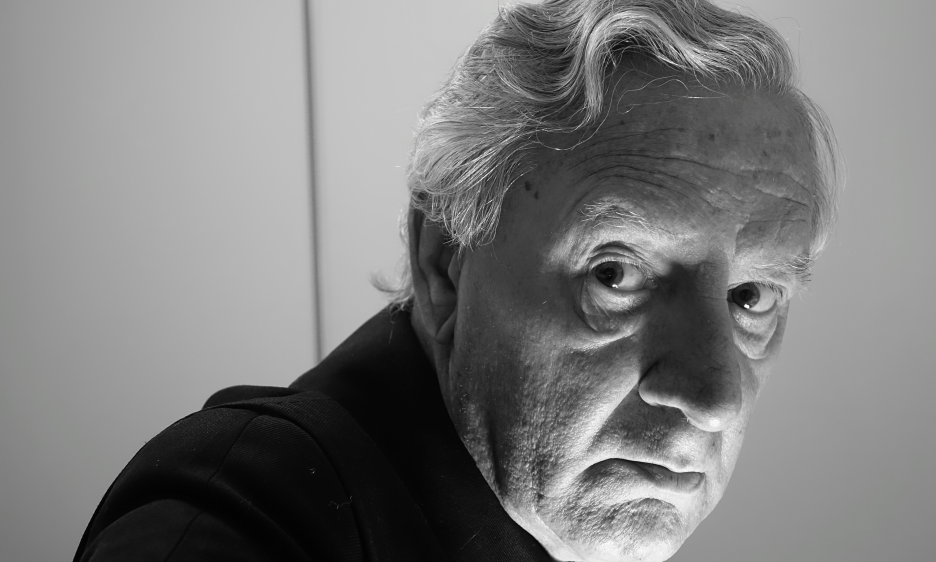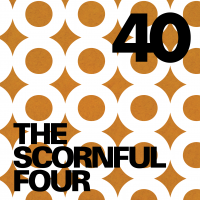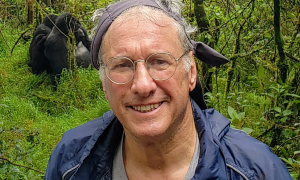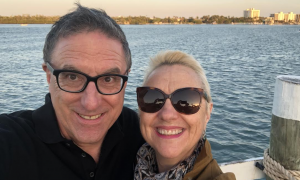Home » Jazz Articles » Out and About: The Super Fans » Meet Martin McFie
Meet Martin McFie

I have seen music move big strong men close to tears, so I don't much care for genres of music or sub classifications of jazz, it's all music. If it's live and in the moment, it has enormous power to intrigue and change our experience.
Tell us a bit about yourself.
I was born in London at a time when the The Beatles, the The Rolling Stones and Tamla Motown ruled. There was trad jazz from [British clarinetist] Acker Bilk, and modern jazz from Cleo Laine, with her three-octave range, and saxophonist John Dankworth. Ronnie Scott had an enduring effect through his club. London was the coolest place on earth. Cool Britannia in clothes, style, and music. Ted Heath and his big band were still playing in a dance hall off the Aldwych. I actually bought Ted Heath's piano many years later, a 1920s German Menzel with a mellow sound and ivory keys. It was the color of honey and identified by the unique number on a metal plate from Harrods, the store that sold it.
My work life had nothing at all to do with music. I worked in shipping and logistics. I did, however, have to take people to the theater, opera, and ballet, all on the company account. I had no training for anything in my life except a driving license. That and a business sense, lots of work, and fearless attack based on complete ignorance have led me into all sorts of trouble, and a little fun. I did learn a couple of languages the lazy way, by living in Paris and Spain.
Now I live in South Carolina in winter and the south of France in summer, and I write books about music. The book sales now support music education in jazz and symphony. Writing gives people a word bridge to walk across into the music. I also produce. I produced La Boheme to great acclaim and financial ruin; it's the grand opera so that was to be expected. The experience of being in rehearsal for a month with such dedicated, talented people was humbling. Recently, I commissioned a new score to recreate Beethoven's 5th Symphony as a "jazzical" crossover for micro orchestra. The title is "Taking The Fifth."
What's your earliest memory of music?
A large brown Bakelite radio, which needed time for the valves to warm up, and then a terrible-sounding transistor radio made in Hong Kong. I remember Louis Armstrong, of course and, at the time, there was a New Orleans revival of trad jazz led by Acker Bilk, who played clarinet out of the side of his mouth and wore a bowler hat and brightly colored vests. "Midnight in Moscow" was a hit in the mainstream charts in England. [Ed note: Acker Bilk's single, "Stranger on the Shore" (1962) became the first Number One single in the U.S. by a British artist].How old were you when you got your first record?
I never have had a record or CD collection. I went to a music shop to buy a record when I was about 10 years old, but came away with sheet music (which I couldn't play) because it cost less than a record.What was the first concert you ever attended?
I was given some last-minute tickets to hear Tony Bennett sing in North London. My date wanted to hear him, but I wanted to hear the supporting act—Louis Armstrong! I don't recall what Tony Bennett sang, but Louis Armstrong sang "Hello Dolly" in his wet gravel voice, and included a scat section. But the big tune was "Aint Misbehavin.'" Hanging back behind the beat, each note was delivered with care, perfection, and precision. Big white handkerchief to mop his brow and a Satchmo smile from ear to ear. That night I heard the great man. I don't remember my date's name, but she went home in a cab.Was there one album or experience that was your doorway to jazz?
Above all Louis Armstrong, but Acker Bilk and his traditional jazz revival was also popular, so it was mainstream for a while, and playing on the radio.How long have you been going out to hear live music?
50 years, more or less.How often do you go out to hear live music?
It depends where I am. In America, it's three or four nights a week, less in London. In France I only go to jazz festivals. In places where there is less jazz, I substitute classical or, better, opera.What is it about live music that makes it so special for you?
The element of surprise. If the mood is right, some truly exceptional music just happens by magic. After all the training and trying, it just happens when least expected. One musician has a great night and lifts the others and the whole room, the music takes on a life of its own, leaving everyone stunned and smiling at each other. I have seen music move big strong men close to tears, so I don't much care for genres of music or sub-classifications of jazz, it's all music. If it's live and in the moment, it has enormous power to intrigue and change our experience.What are the elements of an amazing concert?
Strangely, it's not just the music, it's being receptive and in the right frame of mind to listen. That's out of the hands of the producer and musicians. They can set the scene, prepare a balanced set list and play it well, but the whole audience has to be jointly ready to listen. I have heard concerts where people are enthralled from the first note and others where it just doesn't work. The difference is just the mood of the room, the magic in the mix.What is the most trouble you've gone to to get to a jazz performance?
I travel a lot between Europe and the U.S., so it's no trouble for me. But I do enjoy finding surprise clubs. Last year, I spent a while traveling in my vintage London taxi down to Albania, and I stopped in Budapest. The night before I was leaving, the hotel concierge said there was a jazz club, Lado Café, just down the street. It was a storefront, but inside it had a beautiful wood floor in a long narrow room with one table on each side, and a small proscenium stage flanked by two doors across the end of the room. A smartly dressed band played and sang New Orleans standards, the room was full, and dinner was good.Is there one concert that got away that you still regret having missed?
I didn't go to the Nice Jazz Festival last year, because of the sad terrorist attack the year before. I should have gone in solidarity. I have a small apartment in Nice, so the festival there, and jazz at Juan-les-Pins, nearby, are annual events for me. I shall go this year. Nice is the oldest festival in Europe, a week of variety from thirty-six bands on two stages for a combined capacity of around 10,000. Sadly, even though the city has a conservatoire and good musicians, there is not a single jazz club.If you could go back in time and hear one of the jazz legends perform live, who would it be?
Happily, most of the jazz greats were captured on film, and the atmosphere is still alive in New Orleans. But Bix Beiderbecke recordings probably don't do justice technically to his tonal quality, so I choose Bix.What makes a great jazz club?
A raised stage, good lighting and great sound system, a committed listening policy, where good food or drinks are complementary to the music. A strong relationship with the local community. Some great local musicians choose not to tour, but some touring national and international names anchor the quality of the music.Which club(s) are you most regularly to be found at?
Now my jazz home is The Jazz Corner on Hilton Head Island, which I call "the jazz island," in South Carolina, because it celebrates 540 live jazz performances per year in its various venues, from avant-garde New York to straight ahead, from Paris gypsy jazz to symphonic renditions. The Jazz Corner opened in 1999 with Sir George Shearing, and has stayed open 360 nights a year since then. When I'm in London, I go to Pizza Express. In Paris, Chez Papa, a classic Left Bank club in St. Germain des Pres.Is there a club that's no longer around that you miss not experiencing?
I never went to the Cotton Club, but the idea of wealthy people going to the Cotton Club in its heyday so clearly demonstrates the draw and power of the music. There was no TV or radio, and recordings were poor quality, so raw hard-driving live dance music must have been so exciting.How do you discover new artists?
At festivals. I go to hear any musician anywhere, to listen and learn. I find festivals bring people I haven't heard from other countries with new, sometimes experimental, styles. Of late, there has been some innovative music from Israel, another new twist to follow in the constantly evolving story of jazz. Nothing is right or wrong. It's a broad church where we all have our favorite style, but within the framework everyone gets to play and enjoy their choice.Vinyl, CDs, MP3s, streaming?
I hardly ever listen to recorded music. I need to hear music live. First, because however great the recording, it both loses something of the sound and has been altered in the studio. Second, because of the atmospheric influence we spoke about before. If the audience is with the musician they rise to the occasion together and enthusiasm becomes acoustic. I heard Freddy Cole sing a while ago, the same whisper at the top of his baritone voice as his brother Nat. There were some great live versions of Ella Fitzgerald songs last year to celebrate her 100 years. But it's never the same, and it should never be. It adds poignancy to great work knowing it can never be heard live again. Nothing is forever, so listen now.If you were a professional musician, which instrument would you play and why?
Piano, because it's a whole orchestra.What's your desert island disc?
Someone to "Watch over Me," for the beauty of the lyrics. It just has such beautiful sentiment to fit the desert island situation.What do you think keeps jazz alive and thriving?
Nostalgia, money, conviction, and the best musicians jazz has ever seen, as standard. The future of jazz appears to be moving away from virtuoso million notes a minute to more easily understood and recognizable music with a modern presentation. It is still embracing fast runs but not a continuous cascade of competition between, and for, musicians. Please don't take me or jazz too seriously, it's entertainment for the sake of beauty, not an intense intellectual exercise. Chill and enjoy with a damp glass of something.Finish this sentence: Life without music would be...
Death.Tags
Out and About: The Super Fans
Tessa Souter and Andrea Wolper
Beatles
Rolling Stones
Tamla Motown
Acker Bilk
Cleo Laine
Johnny Dankworth
Ronnie Scott
Ted Heath
Louis Armstrong
Tony Bennett
Bix Beiderbecker
George Shearing
Pizza Express
Chez Papa
Cotton Club
Freddy Cole
PREVIOUS / NEXT
Support All About Jazz
 All About Jazz has been a pillar of jazz since 1995, championing it as an art form and, more importantly, supporting the musicians who make it. Our enduring commitment has made "AAJ" one of the most culturally important websites of its kind, read by hundreds of thousands of fans, musicians and industry figures every month.
All About Jazz has been a pillar of jazz since 1995, championing it as an art form and, more importantly, supporting the musicians who make it. Our enduring commitment has made "AAJ" one of the most culturally important websites of its kind, read by hundreds of thousands of fans, musicians and industry figures every month.


























